Student Blog
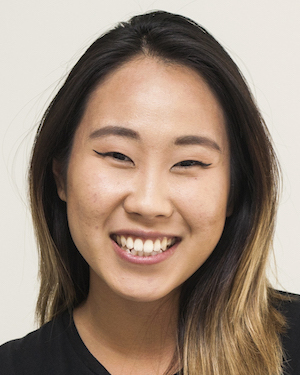
#socialmedia ⟩
February 12, 2019, by Joyce
Have you ever wondered who manages the Chan Instagram and Facebook profiles? How about our Twitter and YouTube handles?
Did you even KNOW we have those platforms? Many people get access to our channels, accounts, and platforms. But it’s been a great joy and opportunity to take the lead on a majority of the content that gets posted on our social media.
So . . . what is it that I really do? Do I just go around taking pictures of people and posting online? To a certain degree YES that is exactly what I do! One of my duties as a student ambassador is to post various events that happen in school. This can range from special speakers to student-led philanthropy events. What I really enjoy about this part of the job is the fact that I can use my love for social media for school and get paid for it!
Snap, Edit, Post!
A majority of the social media is done on the go. When there is an event that’s going on at school, I’ll try to sneak into it for a split second to snap some pictures. If I can’t be at the event physically, I’ll reach out to a classmate who is at the event to take some pictures for me. Then it’s about using editing apps like Snapseed or VCSO to create a cohesive theme like this:
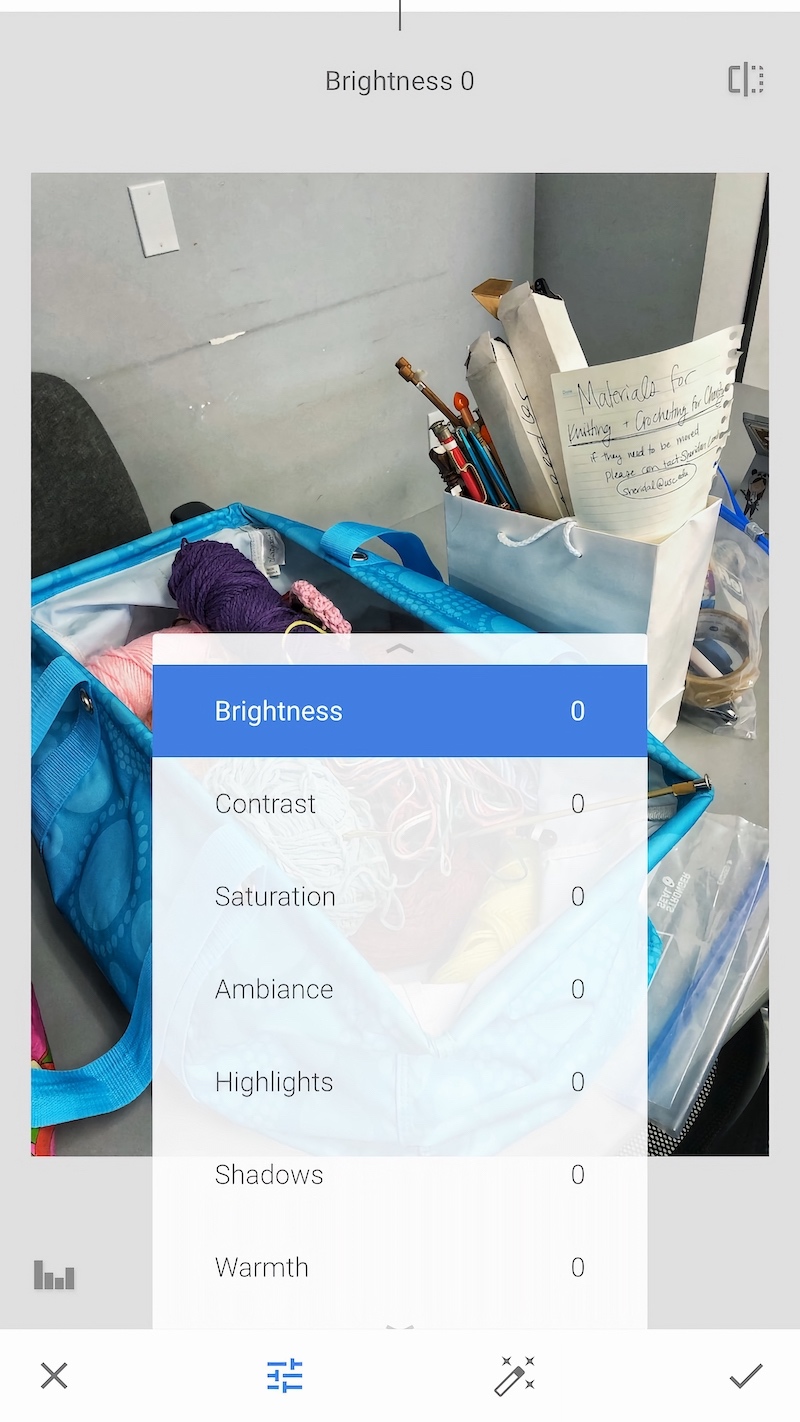
Then straight to posting we go! Sometimes, I enjoy using InstaStory to feature multiple photos rather than posting all of them in one post. I’ll also have other ambassadors or my boss texting me throughout the week asking me if I can post something to our social media handles. I love being on the go because social media is something that I enjoy partaking in.
My camera roll will end up looking like this:
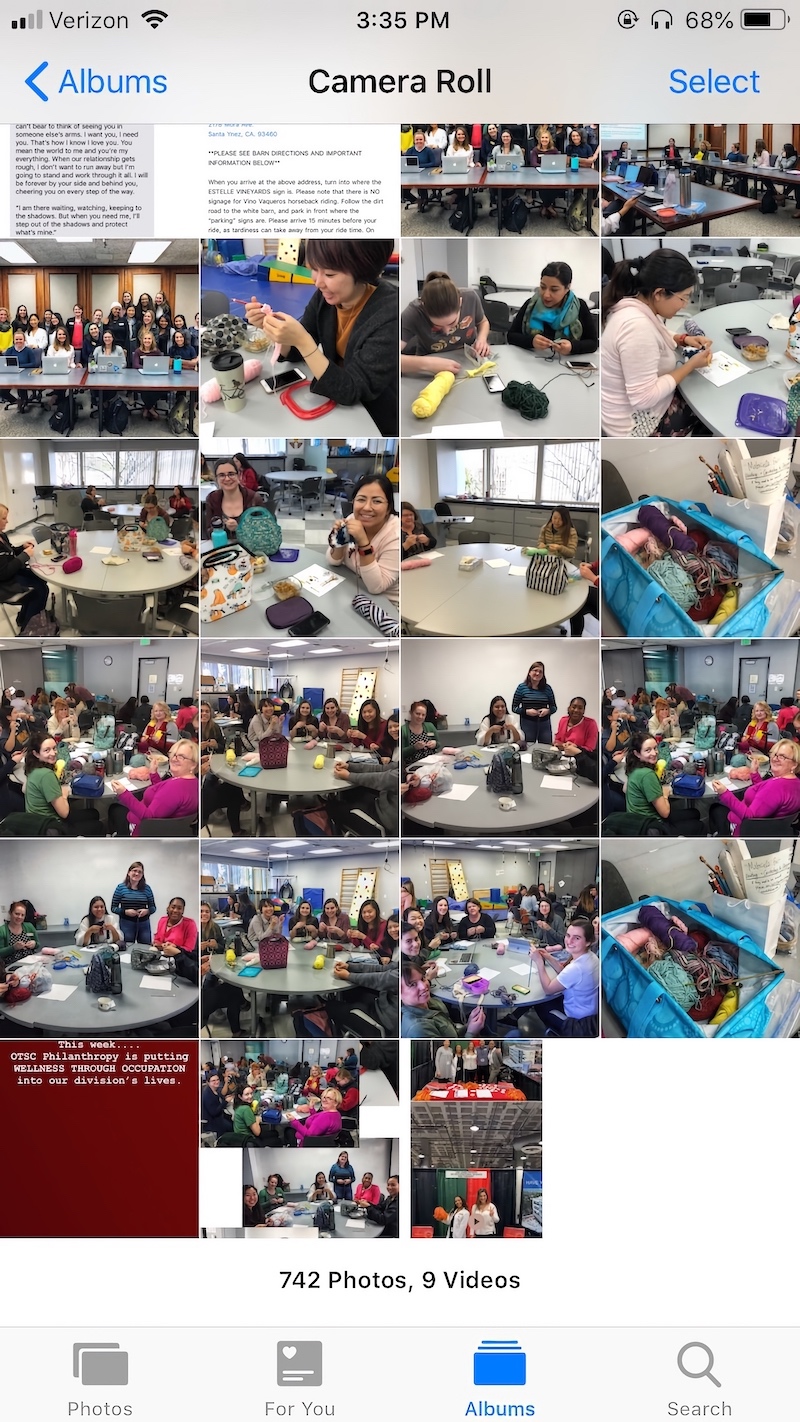
And I’ll receive messages like this LOL:
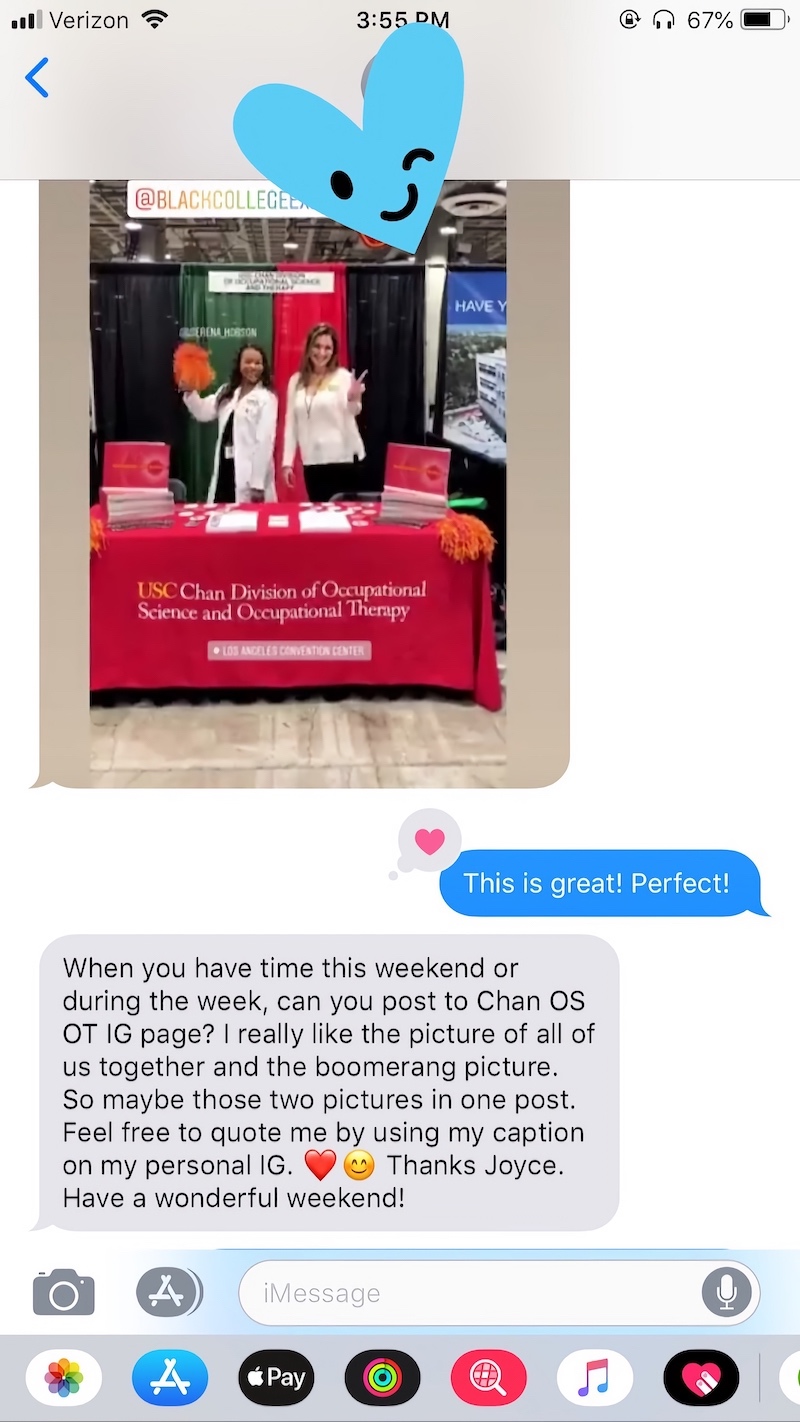
#TrojanTuesdays
For students who submitted their information and pictures to an email address and found themselves on the Chan website . . . well that’s me! I love participating in this project because I get to read a myriad of students’ journey to occupational therapy as well as fun and quirky facts about them. Our program is filled with over 100 students alone in the entry level master’s program! It’s hard to meet everyone but in this way I get to see a little snippet of the people I study with!
It’s all about the Insights
A hidden part of my social media role is pulling data from all the posts that we publish on both Instagram and Facebook. This is done mainly behind the scenes through each handle’s specific analytic software. By pulling the information, I have a clear idea of the kinds of posts that receive the most attention / likes / comments / shares. Then I can focus my energy in creating similar kinds of content!
I never thought that I could get paid to do social media stuff in OT school! It truly has been a fun journey!! Through my interaction with the official Instagram and Facebook handles, I have also been able to speak with people all over the world who are interested in our program!
⋯
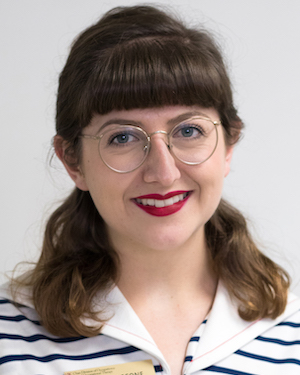
Reflections From My Residency: When did we realize that humans and animals have an emotional bond? ⟩
February 12, 2019, by Antonietta
In today’s culture, where people dress their dogs up for Halloween and get baby strollers for their cats, this may seem like a silly question . . . but when did we realize that humans can have an emotional bond with animals? The debate in “pop culture” can be traced back to 1765 when Jean-Baptiste Greuze completed an intricate portrait in oil paints of a young woman and a dead bird (see below). Each component of this painting isn’t odd for the time period, but what stirred the pot was the young woman’s expression. You can see she looks devastated. From our modern perspective, it is obvious this because her darling pet bird died, but in the mid 1700s it was not part of the zeitgeist to think animals were something you could have an emotional bond with. Jean-Baptiste Greuze observed the people around him and started to challenge this assumption with his painting.
![Greuze, J. (1765). A Girl with a Dead Canary [Painting]. Scottish National Gallery, Edinburgh, Scotland.](https://chan.usc.edu/uploads/student-blogs/antonietta-animals-humans-emotional-bond-feb2019-1.jpg)
Greuze, J. (1765). A Girl with a Dead Canary [Painting]. Scottish National Gallery, Edinburgh, Scotland.
This conversation swirled around for about a hundred years and in 1890 Paul Meyerheim added to the next iteration. He painted “The Jealous Lioness” (see below). His challenge was not only that humans and animals can have an emotional bond, but that animals actually have their own emotions. And not just simple emotions like happiness and boredom, but complex ones like jealousy. This painting illustrates the beginning of the big shift to the modern perspective of how we think about animals.
![Meyerheim, P. (1885-1890). The Jealous Lioness [Painting]. Städelscher Museums-Verein, Frankfurt, Germany.](https://chan.usc.edu/uploads/student-blogs/antonietta-animals-humans-emotional-bond-feb2019-2.jpg)
Meyerheim, P. (1885-1890). The Jealous Lioness [Painting]. Städelscher Museums-Verein, Frankfurt, Germany.
Ok, so how do I know all of this? It started one night during a conversation over dinner with my dad. I was feeling pretty beat from work and Papa asked me about my day. We had had a student at The Children’s Ranch who was struggling. He loved our animals but was not able to keep his body calm and safe around them. We had been using a tool with him, a modified zones of regulation meter, to check in with how he was feeling. It was also intended to teach him how to observe our horses and chickens to see how they were feeling. I’d brought home one of our pocket sized, laminated meters by accident and so I pulled it out and showed my dad (see below). He looked quizzical . . . “but if you’re starting the discussion with the animal’s emotions, then why are the faces emoji’s? Why not have drawings of what the horses actually look like when their emotions change?”
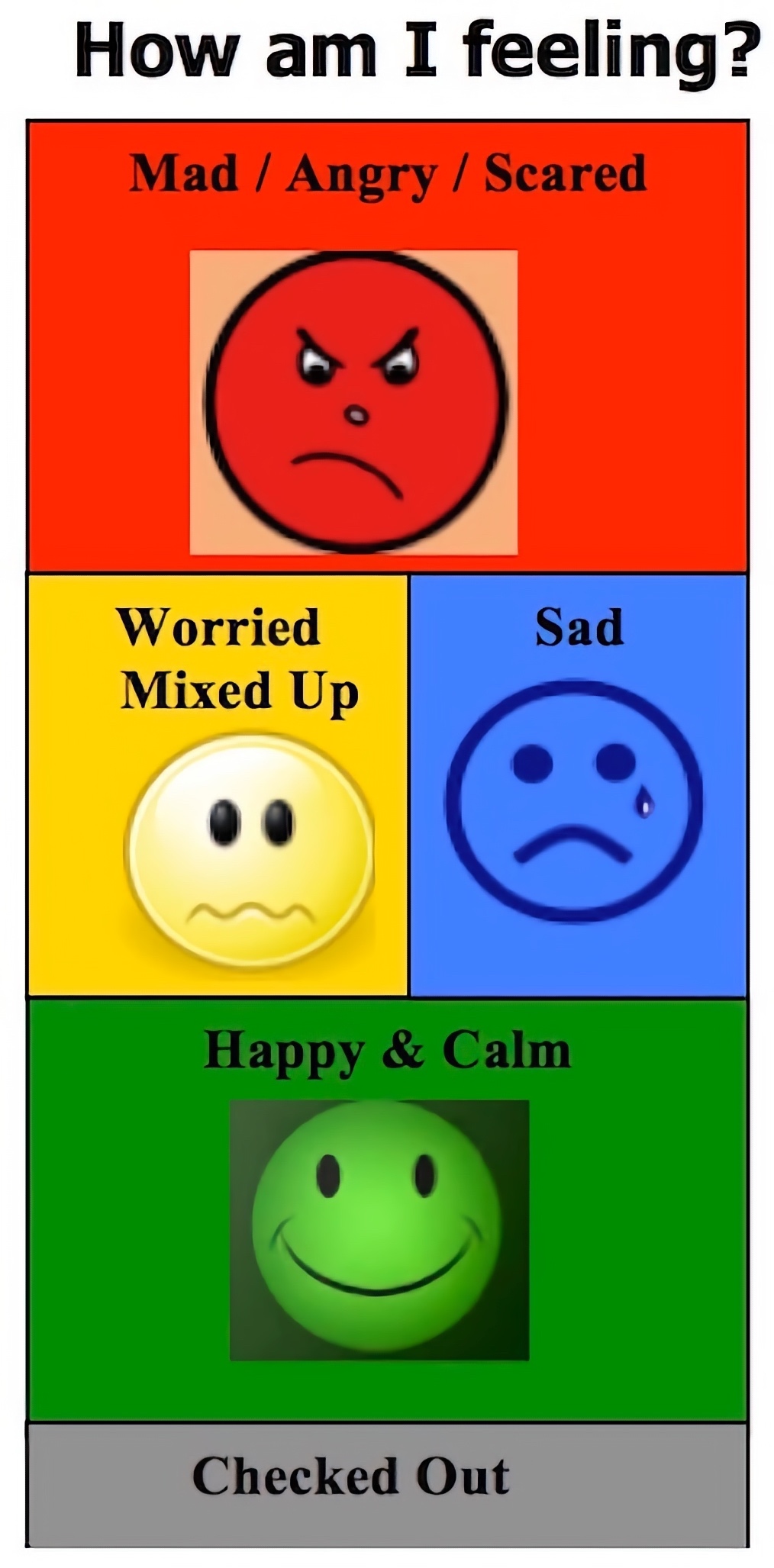
A project was born! My dad (Carmine Iannaccone) is an artist and professor in the Master of Fine Art program at Claremont Graduate University. He is the one who taught me about the two paintings in the beginning of this blog because visual culture is something he studies and is a theme he has been creating artwork around for years. He has this amazing ability to connect almost anything to visual culture, which makes our conversations fascinating and rich. So anyways, the project: a meter which features horses faces showing the different zones. Papa did the drawings, I collated and colored them in Photoshop and now we have a tool which is even more effective than the original (see below). Because humans undoubtedly do have a bond with animals, children are immediately fascinated by the horse meter. When I first show them the little card, they frequently take it right out of my hand to stare at the pictures . . . and then the questions about our horses start rolling in:
“What makes Dove sad?”
“How can I make Storm happy?”
“How can you tell that Pepper is scared?”
“Why is Cody so worried?”
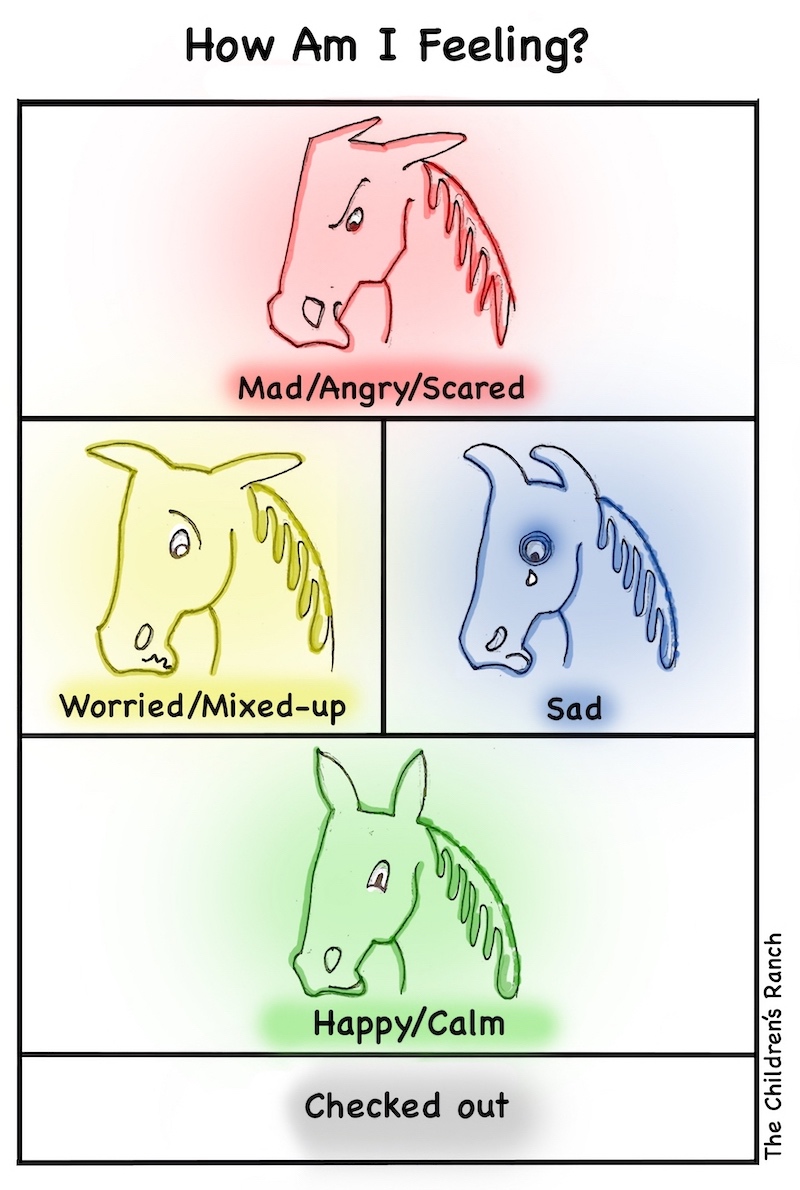
There is always buy-in. The meter flows naturally into and out of our conversations. It is a tool we use together to teach and learn about our animal companions. This collaboration with my dad continued. Inspired by the work of Greuze and Meyerheim (the painters I discussed above), he came to the Ranch every Friday for a semester . . . but more about that in my next post!
⋯
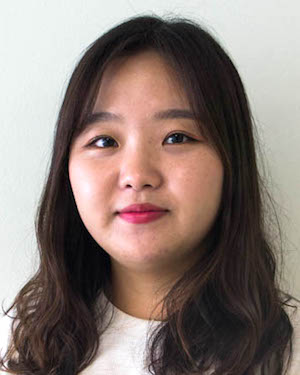
When you need supports: Ask for Help! ⟩
February 11, 2019, by Goeun
Everyone needs support when having a hard time. Especially as international students, it could be harder to find supports since we are far away from home. Before I came here, one concern that I had was where and how to get support as I don’t know anyone here and it was my first time coming to the US. I was worried about my English and I wasn’t confident whether I could do it well or not. However, since I started the Post-Professional Master’s program in the USC Chan Division of Occupational Science and Occupational Therapy, I’ve been supported by so many people and groups in school which I really appreciate.
Here are some resources where you can get help and supports when you need as an international student in the USC Chan Division of Occupational Science and Occupational Therapy.
1. Global Initiatives
When I think of supports as an international student, the first thing that came up in my mind is Global Initiatives. As its title represents, the Global Initiatives team supports international students in our Division to adapt to a new country as well as to help us academically. They’ve held Global Corner which we can join and have fun. Also, they have Academic Peer Mentors, International Student Mentorship Program and Study Hall which supports our academics and hear from previous students as well. In terms of Study Hall, Julianne, who is an Entry-Level Master’s student, help us with English when we’re having a hard time doing assignments or studying exams. I think it really helps us and makes us feel that we are being cared for.
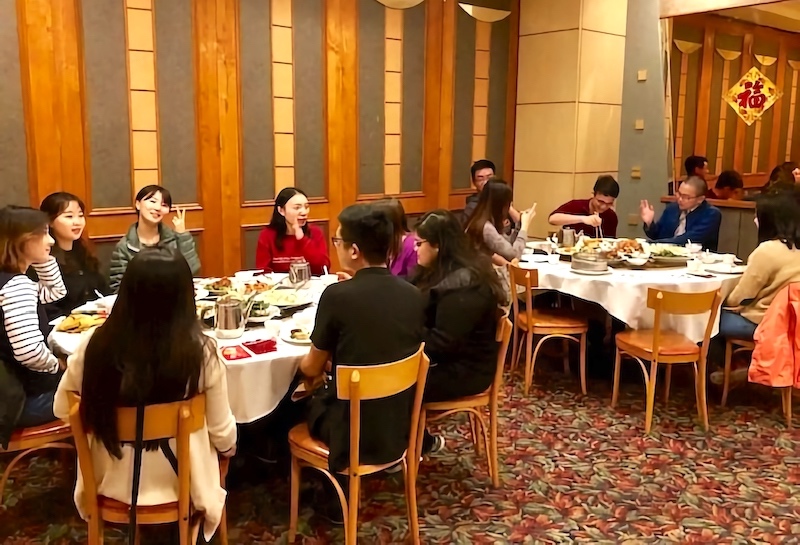
We had dinner to celebrate Lunar New Year altogether.
2. Faculty members
The Chan Division of Occupational Science and Occupational Therapy has more than a hundred faculty members. You’ll not have a chance to meet all of them, but during your program, you can get a lot of support from the faculty members. They help us not only academically, but also with other things. Dr. Blanche and Dr. Ochi, who are the program directors of the Post-Professional Master’s program, have been supporting in so many ways. We were invited to Dr. Blanche’s house for BBQ party in the first month of the program and Dr. Blanche and Dr. Ochi have been asking how have we been doing all the time. Also, Dr. Cermak, who was a professor from our program in the Fall semester, was supportive not only during the class but during the whole semester. I was surprised by how supportive they are and their willingness to help us. Also, when you have interests in some specific part, I’m sure that you can find experts and ask for advice in the Division.
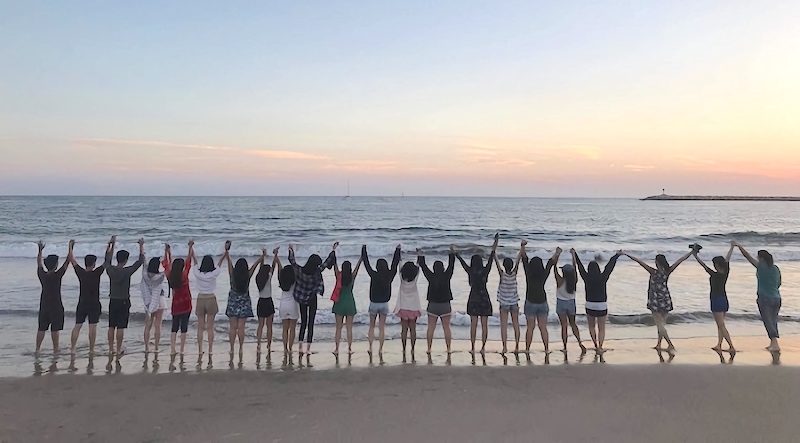
This is a picture from last semester when we went to Dr. Blanche’s house for BBQ Party.
3. Classmates
When you’re struggling with something, you may think that you’re the only person who has the problem. However, since all of your classmates from the Post-Professional Master’s program are mostly international students, they could have the same or similar problems that you have or you have been through. I was really nervous before I start the program, but once I met them in the orientation day, I could feel much better as all of my classmates were so kind and supportive. We had some group works in the Fall semester, and all of us were cooperative, helping each other. We also meet sometimes, hang out together. You can also learn so many things from different cultures to their clinical experiences as an occupational therapist in their countries. It has been really nice having them as my classmates and I’m sure if you come and start the program, your classmates will be too.
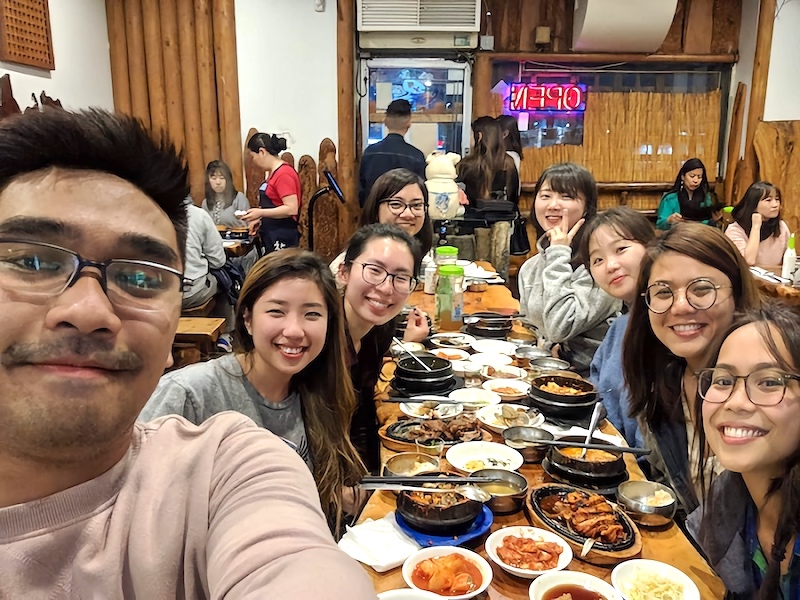
We went to Koreatown for dinner together.
4. Office of International Services (OIS)
OIS is one other support that you’ll need during your study in the U.S. Some things that you need to complete when you first come such as passport verification is done by OIS. Also, while studying, when you travel out of the States, you need OIS for a travel signature. When you’re about to graduate, you’ll need help to apply for OPT visa. Like I mentioned, OIS help us process our visa and stuff, and they have some events too like International Coffee Hour, Movie Night, and Intellectual Writing Session. You can also find some useful information on the website from broadly studying abroad to living in LA specifically.
I really appreciate their help and supports. This is one reason why I chose USC and I think it would have been more difficult studying and living in another country. Lastly, I’m also thankful for the Student Ambassadors and Admission Team since they’ve been supporting me adjust to this position.
⋯
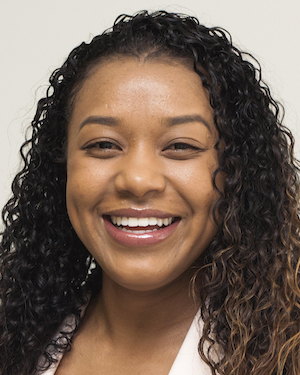
Black College Expo ⟩
February 5, 2019, by Serena
Increasing diversity within the OT profession at the Black College Expo!
What a great way to start off Black History Month! Last year I attended the 2018 Black College Expo, a couple of months ago I attended the Latino College Expo, and this past weekend I was at the 2019 Black College Expo! The annual event is held at the LA Convention Center to increase Black students’ awareness of and acceptance into higher education. It was an honor and joy to be able to mentor college, high school, middle school, and even elementary school students at such a life-changing and well put on event! So many incredible memories were made today, one of which I would love to share about a very bright 4th grader I met.
Future OT: At the age of 9
As I saw a little girl approach the USC OT booth, I immediately became very excited! I mean, I wish someone would have told me about OT while I was in elementary school. I asked her, “Do you know what Occupational Therapy is?” And she replied, “No.” So I then asked, “What do you like to do?” And she said, “I like to play on my iPad.” And I said “Well, if you were to get sick and not be able to play on your iPad then occupational therapists would help you play on your iPad.” She instantly grabbed an OT flyer and clipped an OT pin to her jacket.
After I gave her a more in depth description of OT, she left . . . and then quickly came back with her dad. By the end of the conversation we had planned for her to tour USC’s Health Science Campus to learn more about OT and the various fields of healthcare at the young age of 9!
Thank You!
I am so grateful for events such as the Black College Expo for allowing me to have these wonderful experiences and for having USC’s Occupational Therapy and Occupational Science program in attendance. The other OTs and student ambassador present made the experience that much more special by spreading their love for OT. By attending, we were of course having a great time and helping students find their passions, while addressing AOTA’s Vision 2025 by working on one of the 5 pillars, diversity.
Looking forward to next year!
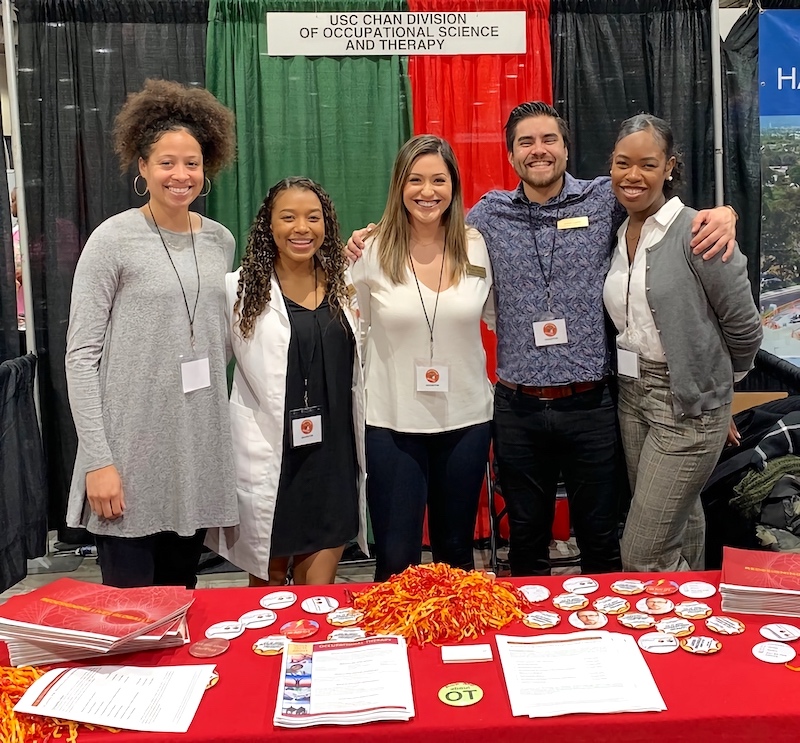
USC occupational therapists and occupational therapy student ambassadors at the Black College Expo Event at the Los Angeles Convention Center. From left to right: Natasha Strickland (OTD student), Serena Hobson (me), Melissa Martinez (student ambassador), Diego Lopez (OTD student), and Laryssa Green (OTD student).
⋯
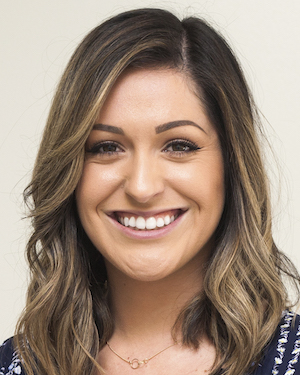
And So It Begins . . . One Last Time ⟩
February 4, 2019, by Melissa
Hey guys! This semester is now in full swing after a wonderful and restful break. For those of you that don’t know, our final semester in the program consists of a variety of electives that allow us to specialize/customize our academic experience! I talk about what that entails in one of my previous posts, so check it out if you’re interested in knowing more!
In this post, I want to talk a bit more in depth about the courses that I am taking, as I find it fascinating that we get this opportunity to customize our learning experience. Although I’ve found our curriculum thus far to be incredibly useful and important for our foundational knowledge of the profession, being able to take courses that I have chosen based on my own personal preferences is amazing! Although I am interested in both pediatrics and adult physical rehabilitation, I chose to focus more on my interests in physical rehab. Thus, I’m taking courses in Primary Care, Acute Care, Neurorehabilitation, and Dysphagia, in addition to our Leadership Capstone, and Occupational Science course. It is definitely a full course load, but I’m enjoying it tremendously.
My Primary Care and Acute Care courses have an additional clinical component in which we get to shadow an occupational therapist in those respective settings. For the Acute class, we get to go across the street to Keck Hospital, where we get to see some incredibly complex cases. The medical complexity surrounding some of the cases we see really adds an additional layer to the problem solving we have to do in our career as OTs. Learning about all of the medical conditions we might encounter in class, and then immediately seeing some of those conditions during our clinical experiences is pretty surreal, but it truly helps to solidify the information that we are learning.
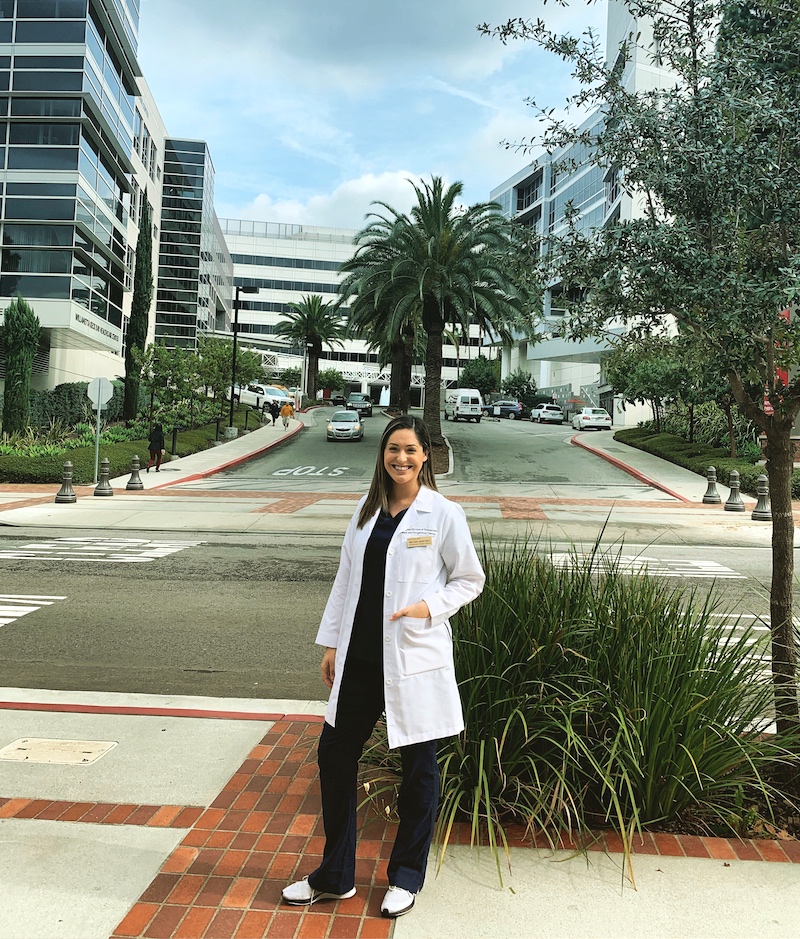
Occupational therapy in primary care is an emerging area for our profession, but it makes complete sense to have OTs in that setting! We learn all about the complexities associated with primary care — particularly surrounding the constantly changing policy and reimbursement challenges — and how that impacts our ability to be included as part of a patient’s care in that setting. For our clinical experiences, we have the option to shadow an OT providing direct care in a primary care setting, or to see what consultative OT looks like as well! Again, being able to apply what we’re learning in class to a real-life situation is amazing, and so helpful for my learning.
Although the Neurorehabilitation and Dysphagia courses don’t have a clinical component, there is still a lot of hands-on learning involved. In Neurorehab, we get to practice different assessments on each other, which is useful because a sense of mastery is necessary to execute these assessments well. In Dysphagia, we learn all about the anatomy associated with swallowing, and also practice swallowing assessments on each other to aid in our knowledge. Another cool thing about the Dysphagia course is that the hours in the course count towards our certification in that area! There is a certain amount of hours that have to be completed as part of that certification, therefore it’s great that we get a head start.
In addition to all of the exciting things going on related to my clinical experiences and electives, I get to look forward to completing my externship in March, welcoming the incoming class in April, and of course graduation in May! I had heard from other students that the Spring semester is a whirlwind that goes by very quickly, and now I definitely know what they mean! If you have any questions about the elective process, any of the specific course, or anything about the program in general, feel free to reach out!
⋯





